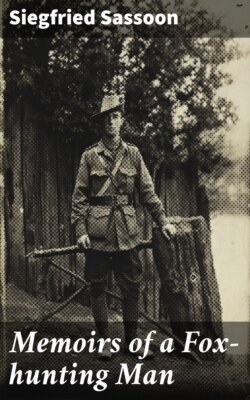Читать книгу Memoirs of a Fox-hunting Man - Siegfried Sassoon - Страница 29
На сайте Литреса книга снята с продажи.
*******
ОглавлениеTable of Contents
The Luncheon Tent stood on that part of the field where the Flower Show ended and the swings and roundabouts began. Although the meal was an informal affair, there was shy solemnity in the faces of most of the players as they filtered out of the bright sunshine into the sultry, half-lit interior, where the perspiring landlord of the ‘Chequers’ and his buxom wife were bustling about at the climax of their preparations. While the cricketers were shuffling themselves awkwardly into their places, the brawny barman (who seemed to take catering less seriously than his employers) sharpened the carving-knife on a steel prong with a rasping sound that set one’s teeth on edge while predicting satisfactory slices of lamb and beef, to say nothing of veal and ham pie and a nice bit of gammon of bacon.
As soon as all were seated Dodd created silence by rapping the table; he then put on his churchwarden face and looked toward Parson Yalden, who was in readiness to take his cue. He enunciated the grace in slightly unparsonic tones, which implied that he was not only Rector of Rotherden, but also a full member of the M.C.C. and first cousin once removed to Lord Chatwynd. Parson Yalden’s parishioners occasionally complained that he paid more attention to cricket and pheasant shooting than was fit and proper. But as long as he could afford to keep a hard-working curate he rightly considered it his own affair if he chose to spend three days a week playing in club and country-house matches all over the county. His demeanour when keeping wicket for his own parish was both jaunty and magisterial, and he was renowned for the strident and obstreperous bellow to which he gave vent when he was trying to bluff a village umpire into giving a batsman out ‘caught behind.’ He was also known for his habit of genially engaging the batsman in conversation while the bowler was intent on getting him out, and I have heard of at least one occasion when he tried this little trick on the wrong man. The pestered batsman rounded on the rather foxy-faced clergyman with, “I bin playing cricket nigh on thirty years, and parson or no parson, I take the liberty of telling you to hold your blasted gab.”
But I hurriedly dismissed this almost unthinkable anecdote when he turned his greenish eyes in my direction and hoped, in hearty and ingratiating tones, that I was “going to show them a little crisp Ballboro’ batting.”
The brisk clatter of knives and forks is now well started, and the barman is busy at his barrel. Conversation, however, is scanty, until Tom Seamark, who is always glad of a chance to favour the company with a sentiment, clears his throat impressively, elevates his tankard, fixes Jack Barchard with his gregarious regard, and remarks, “I should like to say, sir, how very pleased and proud we all are to see you safe ’ome again in our midst.” Jack Barchard has recently returned from the Boer War where he served with the Yeomanry. The ‘sentiment’ is echoed from all parts of the table, and glasses are raised to him with a gruff “Good ’ealth, sir,” or “Right glad to see you back, Mr. Barchard.” The returned warrior receives their congratulations with the utmost embarrassment. Taking a shy sip at my ginger-beer, I think how extraordinary it is to be sitting next to a man who has really been ‘out in South Africa.’ Barchard is a fair-haired young gentleman farmer. When the parson suggests that “it must have been pretty tough work out there,” he replies that he is thundering glad to be back among his fruit trees again, and this, apparently, is about all he has to say about the Boer War.
But when the meal was drawing to an end and I had finished my helping of cold cherry-tart, and the barman began to circulate with a wooden platter for collecting the half-crowns, I became agonizingly aware that I had come to the match without any money. I was getting into a panic while the plate came clinking along the table, but quiet Jack Barchard unconsciously saved the situation by putting down five shillings and saying, “All right, old chap, I’ll stump up for both.” Mumbling, “Oh, that’s jolly decent of you,” I wished I could have followed him up a hill in a ‘forlorn hope’ ... He told me, later on, that he never set eyes on a Boer the whole time he was in Africa.
